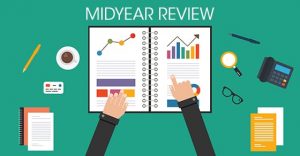 Can you believe that half of 2019 is gone already? That means it’s a great time to take stock of how your business has done for the first half of 2019 so that you can meet your financial goals for the entire year.
Can you believe that half of 2019 is gone already? That means it’s a great time to take stock of how your business has done for the first half of 2019 so that you can meet your financial goals for the entire year.
On Track for Sales
Are you on track to reach your 2019 revenue and profit numbers? The first step is to check your 2019 budget numbers for total revenue. (Don’t have a budget? – Check with us; we’d be delighted to discuss planning with you.)
Next, get your Income Statement for June 2019 Year-to-Date and check the revenue figure. Are you on track with your budget, or are you halfway there revenue-wise, accounting for seasonality? If so, pat yourself on the back! If not, what promotions will you put in place to boost your growth for the rest of 2019?
On Track for Profit
Looking at the same Income Statement, check your net income figure. Are you on track with what you planned? If so, great! If not, the reason is simple: it will be either lower sales than expected or higher expenses than expected.
If your expenses are too high, you’ll need to drill down into each of your expense accounts, including cost of goods sold, to see which ones are higher than expected. Were there some unanticipated costs? Does your pricing need adjusting? Do you need more volume to cover your costs? Do you need to get your costs under control? This is where we can help you with an analysis of where your opportunities are to increase profit.
On Track for Cash
One more place to look is your cash balance. It can be uncomfortable when you are running short of cash for your business. If your balance is lower than you’d like it to be, it could be because of some of the factors mentioned above. It could also be because you just purchased an asset like a truck. If you need help with improving your cash flow, that’s another thing we can help you with.
Mid-Year Review
This mid-year review can help you head off any small problems before they grow into big ones throughout the rest of the year. And it can keep you on track so you can meet your 2019 business goals.
Learn how to Navigate the Homepage of QuickBooks with Rhonda Rosand CPA of New Business Directions LLC.
 When you purchase a new vehicle, you get the fun of riding around in a new car with the new car smell! Our job has just begun – to get your new asset recorded properly on your books. We thought it’d be fun to give you a behind-the-scenes sneak peek at our part.
When you purchase a new vehicle, you get the fun of riding around in a new car with the new car smell! Our job has just begun – to get your new asset recorded properly on your books. We thought it’d be fun to give you a behind-the-scenes sneak peek at our part.
Sales Contract
The first thing we’ll ask you for is the sales contract. It will give us the payment price of your car, and we’ll use that number to record your new asset on your balance sheet. If you paid cash with no trade-in, the journal entry we’ll make is:
| Debit: 2019 Toyota RAV4 | $25,500 |
| Credit: Cash | $25,500 |
Then we’ll decide on a depreciation method and book depreciation monthly or at year-end.
| Debit: Depreciation Expense | $5,100 |
| Credit: Accumulated Depreciation | $5,100 |
Trade-in
If you traded in a vehicle that is on your books, we’ll need to make an adjustment for that. Effectively, your old car will be eliminated from your balance sheet. If this asset had a book value and it was not fully depreciated, the net value would be compared to the trade-in value and a gain or loss on the asset sale would be recorded on your income statement.
Let’s say the balance sheet value of the three-year-old car you traded in was $10,000 ($25,000 original cost less $15,000 accumulated depreciation) and you got $8,000 on the trade-in. Here’s what we would record:
| Debit: 2019 Toyota RAV4 | $25,500 |
| Debit: Accumulated Depreciation | $15,000 |
| Debit: Loss on Sale of 2016 Car | $ 2,000 |
| Credit: Old 2016 Toyota RAV4 | $25,000 |
| Credit: Cash | $17,500 ($25,500 – $8,000 trade-in) |
We’d also start the depreciation for the new car.
New Car Loan
Most often, a new car purchase will be financed, so we have a new liability to record too. We’ll need to get a copy of the loan documents from you and an amortization schedule of the payments. Let’s say you made a ten percent down payment with no trade-in. Here’s how that would look:
| Debit: 2019 Toyota RAV4 | $25,500 |
| Credit: Cash | $2,550 |
| Credit: Toyota Loan | $22,950 |
Then, each time you make a monthly payment, the amount will need to be split between principal and interest and those amounts will need to change each month according to the amortization schedule.
| Debit: Interest Expense | $390 |
| Debit: Toyota Loan | $60 |
| Credit: Cash | $450 |
We left out a few trade secrets just to keep it intriguing. There are a lot of other numbers on a car purchase: taxes, licenses, warranties, add-ons, fees, and more. Some of these can be directly expensed, while others need to be included in the value of the asset. So if you’re happy that we’ll take care of this for you, we’re happy to do so.
Let us know if you purchase an asset this summer so we can get it booked right for you.
 Artificial intelligence or augmented intelligence or automated intelligence (AI) has arrived in the accounting profession in a big way. The good news is it’s streamlining accounting tasks, finding patterns in data you can take action on, and generally making things better. Here are just a few places we’re seeing AI and machine learning impact accounting.
Artificial intelligence or augmented intelligence or automated intelligence (AI) has arrived in the accounting profession in a big way. The good news is it’s streamlining accounting tasks, finding patterns in data you can take action on, and generally making things better. Here are just a few places we’re seeing AI and machine learning impact accounting.
Transaction Coding
Most systems have incorporated some form of machine learning into transaction coding. When bank feeds are imported, each transaction needs to be coded to add the account code in the chart of accounts. Class, tracking codes, and other custom data may need to be added as well. Rules can be set so that the accounting application can pre-code the transactions; in this case the accountant simply approves or corrects the entry.
Invoice Fetching
It starts with a picture of a receipt. Invoice fetching applications can turn pixels into data using sophisticated OCR (optical character recognition). The data is then turned into a business transaction that can be imported into an accounting system.
Auditing
The books of many government agencies, nonprofits, and large businesses need to be audited on a regular basis. Auditing is an expensive process. Smart programs can review a company’s data and assess where the risks and anomalies are so that the audit program can be modified to focus on the more important parts. This reduces risk and cost for everyone involved.
Accounts Payable
Automated intelligence can help to speed up the matching of purchase orders, packing slips, and invoices so that accounts payable tasks are streamlined. It can also automate approvals and look for duplicate invoices to avoid overpayments.
Accounting Tasks That Are Clerical
Robotic Process Automation (RPA) is a platform that allows users to create automation without involving the IT department. Think Excel macros or Zapier on steroids. Any workflow with a mind-numbing set of clerical steps is a candidate for RPA.
AI allows accountants to spend less time on routine tasks and more time on higher-level analysis work. As AI becomes more affordable for small businesses, everyone will benefit from this long-term trend.

 Insightful Accountant has announced their “Top 100 ProAdvisors for 2019”
Insightful Accountant has announced their “Top 100 ProAdvisors for 2019”
 New Business Direction LLC
New Business Direction LLC
